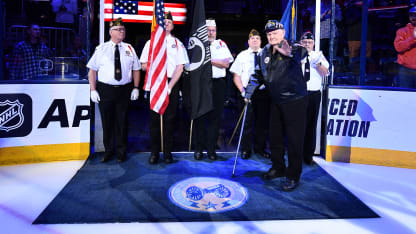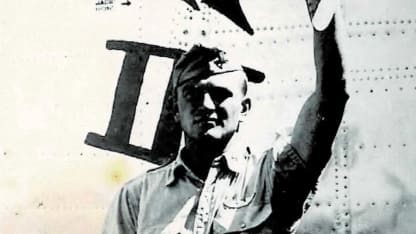When World War II broke out, it took everyone in the United States coming together to defeat the Axis powers.
For Alexandria, Ohio, native Robert Hickman, that meant going to the front lines of the conflict in the European theater. Born in January 1925, Hickman had to wait until early 1943 to turn 18 and join the armed forces, but soon enough, he was a tail gunner on some of the most dangerous missions in the decisive ending months of the war.
World War II veteran returned to Central Ohio a hero
Elk+Elk military honoree Robert Hickman flew 53 missions during a decorated career

Not that that dissuaded Hickman from doing what he believed was his duty.
"I didn't think of the danger, I really didn't," Hickman recently told BlueJackets.com. "We were all sent over there to do a job."
In the end, though, the danger was real, as the Air Force staff sergeant and his crew on the "Flak Shak" bomber found out June 28, 1944. Under heavy fire from German forces on a mission to Bucharest, Romania, the Flak Shak was hit by more than 500 rounds of fire.
The result was that Hickman was left with multiple wounds from enemy fire, including a skull fracture. Yet Hickman not only survived, he returned to his post to complete 53 different bombing missions before the end of 1944.
Almost eight decades later, Hickman is now 98 years old and lives in Newark. On the team's Military Appreciation Night festivities during the Jan. 5 game against the Washington Capitals, Hickman was recognized as the Elk+Elk Blue Jackets military salute honoree, walking onto the ice to thunderous applause from those in Nationwide Arena.
"It was quite a feeling," Hickman said. "You couldn't be more surprised than I ever was. It was nice, it really was."
ROBERT HICKMAN, Jan. 5
In fact, the game was the first time Hickman saw the Blue Jackets in person at Nationwide Arena. He has watched the games on television over the years and has a family with an interest in the sport, but Hickman couldn't help but be impressed by what it was like to watch a game live for the first time.
"I had never seen one," he said. "I see them on the tube, but you don't see it all. It was quite interesting to go there. I never thought you could hear the puck hit the stick. Man, it makes noise. I couldn't believe it.
"I really enjoyed it. Seeing a whole game in person is no comparison to seeing it on the tube."
One can excuse Hickman, who went on to work in the excavating business in Central Ohio upon his return from the war and didn't retire until age 82. He also married into a family with five kids, which took up plenty of his time, so it's not like he wasn't plenty busy over the years.
You get the sense the native of Licking County wasn't one for sitting still over the years, as he was raised on a farm and lettered in football and basketball at Alexandria High School. Shortly after his 18th birthday, he dropped out of school in February 1943 and reported to Fort Hayes in Columbus to join the war effort.
After basic training in St. Petersburg, Fla., he trained as an armory gunner in Denver, then reported to Alamogordo, N.M., to study more on bombs and ammunition. Finally, in December 1943 he left for Europe, and his first jobs included building runways for American planes returning to posts in Italy and loading the payload that was placed onto bombers for their missions.
His move to combat duty came after the SS Paul Hamilton was sank in April 1944, resulting in the deaths of 154 officers and men in the 831st Bombardment Squadron. With the American forces in need of tail gunners, Hickman volunteered and quickly ended up with Capt. Volney Wiggins on the famous B-24 known as "Life."
"I wanted to fly," he said. "I worked with the airplanes anyway. They needed men, and I said, 'I'll go.'"
Operating as a tail gunner on those missions was hardly easy. There was often enemy fire as the Americans constantly flew into Romania to attack the Ploesti oil fields that were key to the Axis supply lines, and engaging in combat was hardly easy in the primitive years of the B-24.
"The thrill was when you were shooting and got an airplane down," he said. "Got one or two, I think it was. I forget how many it was."
Stationed in Italy, Hickman eventually ended up on the Flak Shak bomber with Capt. Wiggins in the 831st Squadron. On June 28, 1944, the crews woke up before dawn for another mission in Romania, but it turned out to be a harrowing journey, with the American convoy under intense fire throughout the mission into Bucharest.

© COURTESY OF THE HICKMAN FAMILY
Nine Luftwaffe fighters sprayed the Flak Shak, the lead plane in the formation, with gunfire, wounding almost every member of the crew. Returning fire from the Flak Shak downed seven of the nine enemy planes, and the bombing mission was a success.
Hickman himself was credited with shooting down at least one plane, but it came at a cost. At one point, Hickman saw a cannon shell coming at him and it did not miss, blowing off the top of his turret and striking him in the head, leaving blood streaming down his face. Once he regained his bearings, Hickman looked behind him and saw flames beginning to shoot through the body of the plane, so despite his injuries, he jumped out of the turret and smothered the flames with a parachute.
After returning to his position, Hickman was struck with shrapnel again, eventually passing out in his seat. He might have been saved by the actions of navigator Kenneth Leasure, who went through the plane to tend to his injured crewmates after the German attacks, tearing up parachutes to use in first aid to stop the bleeding and keep the young men alive.
Somehow, the plane stayed in the air, and pilot Wiggins was able to nurse the bullet-ridden aircraft to safety back in Italy, with medics on hand to treat the wounded. All 10 members of the crew miraculously survived the mission, earning the entire crew Silver Star recognition.
"I'm lucky," Hickman said of surviving. "We had Plexiglass that was that thick. They guaranteed a shell wouldn't go through that. Well, that airplane was at just the right angle, it got through it. That's what got me in the head."
Hickman spent weeks in the hospital, then went back to combat. In the end, he completed his more than 50 missions over Yugoslavia, Italy, France, Austria, Germany, Hungary, Romania, Poland and Greece.
"They wanted to send me home on 25 and I said, 'No, you sent us over to do a job,'" Hickman said. "I went through the next 25 and I said, 'No, I don't want to go home.' I did three more, and I said, 'You know, you're stupid. You better get out of here.'"
Hickman started his return to the United States in December 1944, and his military honors include the Silver Star, a Purple Heart, and the Air Medal with both Silver and Bronze Oak Leaf Clusters. Many of his World War II records and medals were later destroyed in a fire at the Alexandria family home, but his daughter worked with the late Sen. John McCain to get them replaced.
The family has continued to travel the United States for World War II reunions and events, and Hickman was able to do an Honor Flight to Washington, D.C. as well. He has said he hopes to live to 104 years old, and until the day he goes, he'll be recognized a hero wherever he goes.
"If I wear my hat and go anywhere, people will recognize me and thank me," he said. "It's nice to be recognized."


















